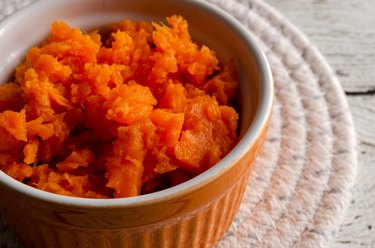
The pain of passing a kidney stone can be unbearable. Once you've had one of these crystallized masses in a kidney and experienced its journey to leave the body, chances are you're ready to do anything you can to avoid another. Well, one solution could be a specific kidney stones diet.
A majority of kidney stones are made of a substance called oxalate, and oxalate is naturally found in many of the foods we eat, according to the Cleveland Clinic. When your urine contains too much oxalate and not enough liquid, the oxalate can combine with calcium to make calcium oxalate stones in your kidneys, according to the National Kidney Foundation.
Video of the Day
Video of the Day
"In fact, 60 to 75 percent of stones in adults contain calcium oxalate," says Joseph Harryhill, MD, a urologist and clinical associate professor of urology in surgery at the Perelman School of Medicine in Philadelphia.
Limit High-Oxalate Foods
If you've had one or more kidney stones, your doctor should be able to tell you if they are made of oxalate. If they are, you can help prevent future stones by avoiding foods that are high in oxalate, along with other dietary changes, according to the National Institute of Diabetes and Digestive and Kidney Diseases (NIDDK).
However, you don't want to cut out all foods with oxalate. In fact, it would be very difficult to do so and still maintain a healthy diet, according to the Cleveland Clinic. Many high-oxalate foods have a bounty of good-for-you nutrients.
According to the National Kidney Foundation, some foods high in oxalate to avoid are:
- Spinach.
- Nuts and nut butters.
- Wheat bran.
- Beets.
- Rhubarb.
- Chocolate.
- Sweet potatoes.
Also, consider cutting down on beverages — coffee and brewed tea in particular — that have lots of oxalate, Dr. Harryhill says.
It’s Not Just the Oxalate
On its own, cutting out oxalate-rich foods likely isn't enough to prevent kidney stones, Harryhill says. There are several other dietary changes you may need to make as well. Add these steps to your plan:
- Drink more fluids. Because kidney stones form when there is not enough liquid in the urine to keep substances like calcium and oxalate from joining together, staying hydrated is the most important thing you can do to prevent them. Try to drink 6 to eight 8-ounce glasses of liquid daily (preferably water), according to the NIDDK. Adding lemon to your water can be extra helpful, as the citrate in lemons "is nature's most potent stone inhibitor," Dr. Harryhill says.
- Cut down on animal protein. Eating excessive amounts of animal protein can make your urine more acidic, creating an environment that is more susceptible to stone formation, according to the American Urological Association. Consider limiting (but not eliminating) your intake of red meat, chicken and fish. To make sure you still get enough protein, try replacing some meat with plant-based proteins like beans, dried peas and lentils, according to the NIDDK.
- Eat less salt. Too much salt can increase calcium levels in your urine, making it easier for stones to form, according to the National Kidney Foundation.
- Get enough calcium. While it may sound like a good idea to avoid calcium by cutting down on dairy if you suffer from calcium-oxalate stones, this is actually untrue. Too little calcium can heighten your risk of forming calcium-oxalate stones (and can put bones at risk). Calcium binds with oxalate in the stomach and intestines, lowering the chance that oxalates can form into stones when they reach the kidneys, the National Kidney Foundation says. Ask your doctor about the right amount of calcium for you.
Having one kidney stone increases your risk for more, Dr. Harryhill says. Staying vigilant about these diet changes can help you lower that risk.
Read more: What Vegetables Should Help Kidney Stones?
- Cleveland Clinic: “Kidney Stones: Oxalate-Controlled Diet”
- National Kidney Foundation: “Calcium Oxalate Stones”
- Joseph Harryhill, MD, urologist, Penn Urology University City, clinical associate professor, urology in surgery, Perelman School of Medicine, Philadelphia
- National Institute Diabetes and Digestive and Kidney Diseases: “Eating, Diet, and Nutrition for Kidney Stones”
- American Urological Association: “Kidney Stones”
Is this an emergency? If you are experiencing serious medical symptoms, please see the National Library of Medicine’s list of signs you need emergency medical attention or call 911.